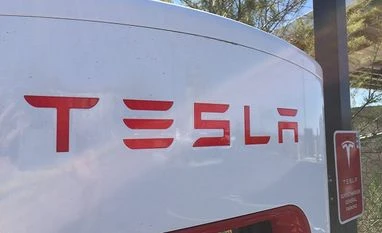Tesla Inc Chief Executive Elon Musk's refusal to take questions from analysts about the electric car maker's financial condition drew sharp criticism from Wall Street analysts and investors on Thursday, pushing its stock down 7 percent.
In a conference call on Wednesday, Musk refused to answer questions from analysts on Tesla's capital requirements, saying "boring questions are not cool."
Cowen analyst Jeffrey Osborne dubbed Wednesday's call, in which Musk talked of "barnacles, flufferbots, and bonehead bears", surreal. Morgan Stanley's Adam Jonas said it was the most unusual call he had heard in 20 years in the business.
At least three brokerages lowered their price targets on the stock. Of 27 brokerages covering the stock, nine have a "buy" or higher rating, 10 "hold" and eight have "sell" or lower.
"Tesla refused to address analyst questions on capex, cash burn and other 'boring bonehead questions,'" Osborne said.
The call came after Tesla forecast a reduction of capital expenses for the year and affirmed that it will turn a profit in the second half of the year.
More From This Section
The company's shares were down $19 at $282 in premarket trading. The stock has lost more than a quarter of its value since touching a high of $389.61 in September, mainly due to reports of bottlenecks around its Model 3 production.
"Investor feedback to the call was shock that a CEO would be dismissive and the general sentiment was that the defensiveness spoke volumes," said RBC Capital Markets analyst Joseph Spak, who lowered his price target on Tesla shares 8 percent to $280.
In a note titled "The Importance of 'Boring' Questions," Morgan Stanley's Jonas called into question Tesla's financial standing.
"While they may be 'dry' in nature, we argue such questions are extremely important for a highly-levered and cash-hungry company," Jonas said.
Tesla is burning cash as it tries to ramp up production of its Model 3 electric car that is seen as crucial to the company's growth and future profits.
Free cash flow, a key metric of financial health, widened to negative $1 billion in the first quarter from negative $277 million in the fourth quarter, excluding costs of systems for its solar business.
Musk had said Tesla does not need to raise cash this year.
Tesla has raised capital each year since its initial public. offering and issued debts twice in 2017.
The company plans to reach its weekly goal of producing 5,000 Model 3 cars in two months, after revising the target several times.
Tesla's use of robots to assemble Model 3s has led to more complexity and delays, which Musk acknowledged last month.
"We believe that Tesla is essentially learning how to become a manufacturing company on the fly," said Spak. "While we don't have meaningful reason to doubt that Tesla can eventually achieve its targets, doing so in a timely manner without some growing pains could prove challenging."
)